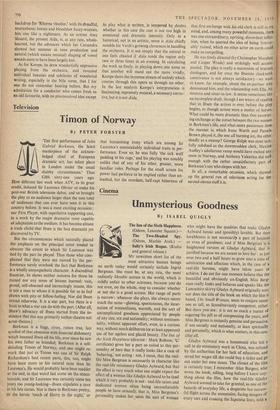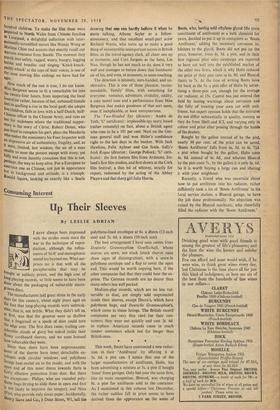Cinema
Unmysterious Goodness
By ISABEL QUIGLY The Inn of the Sixth Happiness. (Odeon, Leicester Square.)— The Two-Headed Spy. (Odeon, Marble Arch.) Sally's Irish Rogue. (Rialto and general release.) MY unwritten short list of the most attractive human beings on earth today would certainly include Ingrid Bergman. She must be, at any rate, the most radiantly likeable actress in the world, which is mildly unfair to other actresses, because you do not even, on the whole, stop to consider whether or not she is a good actress. Her range of parts is narrow: whatever she plays, she always seems much the same—glowing, spontaneous, the incar- nation of womanliness, warmth, and the sort of uncomplicated goodness appreciated by people of any size, sex and nationality; without sentimen- tality, without apparent effort, even, in a curious way, without much deliberate (or at least apparent) use of her ageless and placid beauty. The Inn of the Sixth Happiness (director : Mark Robson; 'U' certificate) gives her a part so suited to this per- sonality of hers that it really looks like a case of 'behaving,' not acting : not, I mean, that the real- life Miss Bergman is necessarily in character like the real-life missionary Gladys Aylward, but that the effect is very much what one might expect the effect of a woman like Gladys Aylward to be (and which it very probably is not : real-life saints and dedicated women often being uncomfortable people to have around); that is, Miss Bergman's personality makes her seem the sort of woman who might have the qualities that make' Gladys Aylward heroic and (possibly) lovable. But then lovableness is not necessarily a part of heroism or even of goodness; and if Miss Bergman is a heightened version of Gladys Aylward, that is justified because we are meant to love her : in just over two and a half hours to grow into a state of admiration and affection which, in the case of a real-life heroine, might have taken years to achieve. I do not for one moment believe that the beautiful and obviously un-English Miss Berg- man really looks and behaves and speaks like the Lancashire skivvy Gladys Aylward originally was; nor does the title of the book on which the film is based, The Small Woman, seem to conjure some- one as tall, as Scandinavianly competent, either. But there you are: it is not so much a matter of sugaring the pill as of compressing the years, and Miss Bergman is instantly genuine and persuasive, if not socially and nationally, at least spiritually and personally, which is what matters, in this case, after all.
Gladys Aylward was a housemaid who felt a call to do missionary work in China, was refused by the authorities for her lack of education, and saved her wages till she could buy a ticket and go out under her own steam. The climax of the 111111 is certainly true; I remember Alan Burgess, who wrote the book, telling, long before I knew any- thing about the film, how the real-life Gladys Aylward seemed to take for granted, as one of the hazards of everyday life, a desperate but success- ful flight across the mountains, facing dangers of every sort and crossing the Japanese lines, with a An undergraduate writes from Cambridge to say that packet soups are his staple diet for lunch —which seems to me a shocking reflection on the Trinity kitchens—and enclosing a sachet labelled 'Lobster Bisk' from which he has extracted the nutriment (consisting, according to the packet, partly of Tomato power, dehydrate fishes and crustaceas, greens and mushrooms extract, con- centrated of lobsters and fat matters), for the sake of the directions. These advise him to 'add the small bag content in a pint, of cold water briskly
A Doctor's Journal
By MILES WHAT goes on inside the brain? Almost all that is known about the function of that marvellously intricate network of many millions of cells and fibres is derived from inference and not from direct observation. Electrical record- ing of brain activity by electrodes placed on the outside of the skull—the EEG or the 'brain waves'—has not yielded much evidence about the workings of the normal nervous system; the alpha rhythm, a regular pulsation recorded with the patient at rest, is really a rhythm of inactivity— as soon as the mind becomes active, it disappears. Dissections of brain tissue, preserved in formalin, provide the anatomist with data on which to draw up his 'maps' of the principal cell areas and fibre tract connections, but that is a very long way from finding out what happens in the stiring' and to 'raise to ebullition.' I don't think much of packet soups as a regular diet, but it's nice to have something to read over lunch.
A postscript to my articles, a few weeks ago, on how long different types of food keep in a refrigerator : a correspondent writes :
Did you know that slugs keep perfectly for a fortnight in a Cellophane bag full of parsley? They are as good as new when released.
The Magic Net
HOWARD brain during life. It is fashionable just now to point out resemblances between the human ner- vous system and an electronic computer, and, of course, these two have many features in common which it may be profitable for the observer to study; more important, though more difficult to comprehend, are the differences.
Only rarely is the medical observer so fortu- nate as to have direct access to the brain itself while the patient is conscious. The neurosurgeon, during an operation, may find himself in this































































 Previous page
Previous page